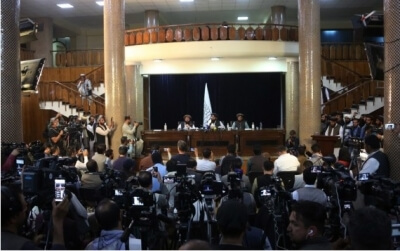Water deficits are linked to 10 per cent of the increase in total migration within countries between 1970 and 2000, a World Bank report has said.
Stating that by the end of this century, worsening droughts are projected to affect about 700 million people, the Report ‘Ebb and Flow’ said: “These climate shocks will have a disproportionate impact on the developing world, with more than 85 per cent of people affected living in low- or middle-income countries.”
Yet “it is often the poor who cannot afford to leave. Residents of poor countries are four times less likely to move than residents of wealthier countries”.
As climate change accelerates a global water crisis, rainfall variability is expected to be one of the contributing forces in migration, the World Bank said in a release.
Globally, water shocks affect not only the number of people who move but also the skills they bring with them.

“Migrants who leave regions with lower rainfall and frequent drought usually possess lower educational levels and skills than other migrant workers, implying significantly lower wages and less access to basic services at their destination.
This raises important policy implications for receiving cities,” it said.
The report anticipates that the world’s cities, which receive migrants and are now home to 55 per cent of the global population, will face a rising number of “day-zero” events – when taps run dry.
The report, released earlier this week, provides the first-ever global assessment of the impact of water on migration.
It is based on analysis of the largest data set on internal migration ever assembled, covering nearly half a billion people from 189 population censuses in 64 countries, and several national and global data sets that have been combined for the first time.
The report was funded in part by the Global Water Security & Sanitation Partnership, a multi-donor trust fund based at the World Bank’s Water Global Practice, the release said.
In the Middle East and North Africa (MENA), where 60 per cent of the population lives in water-stressed areas, the report notes that water is already one of the main vulnerabilities faced by people living in the region, particularly those displaced by conflicts and their host communities.
“As the fight against the Covid-19 pandemic continues, climate change is fueling water challenges around the world, which will hit developing countries hardest,” the release quoted World Bank Managing Director for Development Policy and Partnerships Mari Pangestu as saying.
“In cities receiving migrants from rural areas due to rainfall variability, it pays to prevent such crises in an integrated way, to support green, resilient and inclusive development.”
Cities are also facing an increasing number of day-zero events, where they risk running out of water.
Alongside recent acute water shortages in Cape Town, South Africa, Chennai, India, Sao Paolo, Brazil, and Basra, Iraq, dozens of smaller cities contend with similar events but do not make international headlines.
“Policies and infrastructure needed to build water resilience are expensive, but a drought is far more costly, potentially reducing a city’s economic growth by up to 12 per cent,” it said.
The report highlights ways cities can tackle these challenges, such as reducing water demand, recycling wastewater, harvesting storm water, and redesigning urban areas to resemble sponges that soak up water and store it below ground, the release added.














